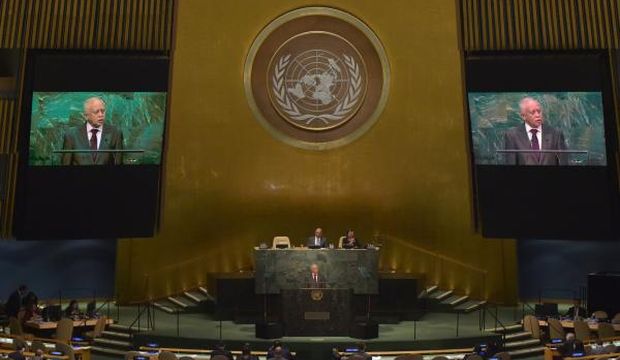
Yemen’s Foreign Minister Riyadh Yassin addresses a plenary meeting of the United Nations Sustainable Development Summit 2015 at the United Nations headquarters in Manhattan, New York, on September 26, 2015. (Reuters/Darren Ornitz)
Washington, Asharq Al-Awsat—Yemen’s Foreign Minister Riyadh Yassin on Saturday criticized the UN Security Council for its response to the crisis that has plunged the country into turmoil for over a year.
Speaking to Asharq Al-Awsat via telephone from New York—where he is attending the UN General Assembly—Yassin said the Security Council had not put enough pressure on the Houthi rebels currently in control of large parts of Yemen to comply with Security Council Resolution 2216.
The resolution, adopted in April, stipulates the withdrawal of the Iran-backed Houthis from areas under their control and handing over their weapons to the government.
“The Houthis, even up to this point, refuse to acknowledge the resolution and [their representatives] are staying at Omani hotels, without making any positive efforts towards implementing the resolution,” Yassin said, making reference to the meetings which Houthi delegations have held over the past months in the Omani capital Muscat with the UN’s special envoy to Yemen and Omani officials.
He said the internationally recognized Yemeni government was facing pressure from numerous sides—though he declined to specify whom—to “acquiesce to the reality of the situation and hold direct meetings with those who use arms against the Yemeni people,” in reference to the Houthis and followers of ousted former president Ali Abdullah Saleh, who alongside Iran is the Houthis’ main ally.
Yemen’s crisis began just over a year ago when Houthi rebels occupied the capital Sana’a. Aided by Iran and members of the security establishment still loyal to Saleh, the Houthis were able to take over government, military, and media buildings and installations while facing little resistance.
They then spread across the country, occupying other cities and towns while targeting civilians. International NGO Human Rights Watch has documented evidence of Houthi militias attacking civilian areas with mortar shells and rockets and says the evidence could mean Houthi leaders and commanders are liable to stand trial over human rights violations.
In February the Houthis launched a coup, deposing President Abd Rabbuh Mansur Hadi and the government. Hadi later headed to Saudi Arabia after escaping a Houthi-imposed house arrest and requested Riyadh and its Arab allies intervene in Yemen with military force in order to restore political legitimacy in the country.
Aided by Saudi-led airstrikes, Yemeni government loyalist forces have now made significant inroads against the Houthis, with the tide of the conflict now turning in their favor.
In July and August the loyalists, known as the Popular Resistance, were able to liberate most of the country’s southern areas from Houthi control, including the strategic port city of Aden.
Several members of the cabinet including Prime Minister Khaled Bahah have returned to Aden in recent weeks to help restart the government’s work in the country.
President Hadi visited Aden last Tuesday, the first time he has been back in Yemen since he fled six months ago.
Hadi will arrive in New York on Sunday to attend the UN General Assembly. Yassin told Asharq Al-Awsat the president would be meeting with several world leaders in New York and will travel to other countries following the Assembly, after which he will return to Aden permanently.
